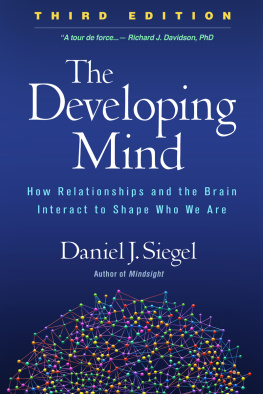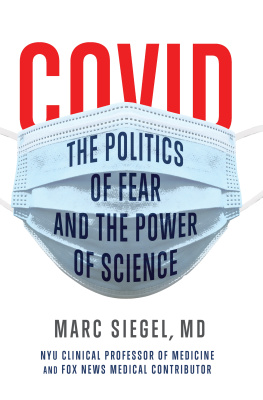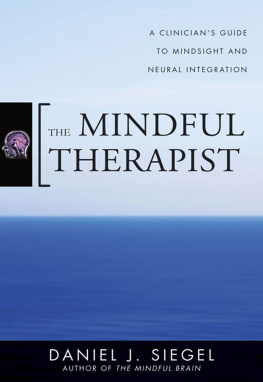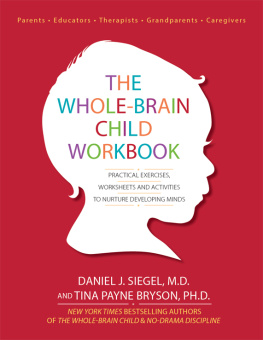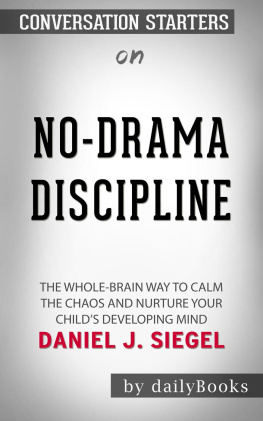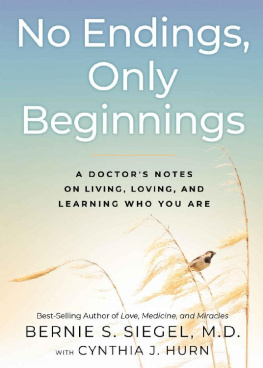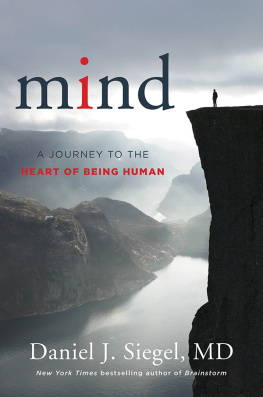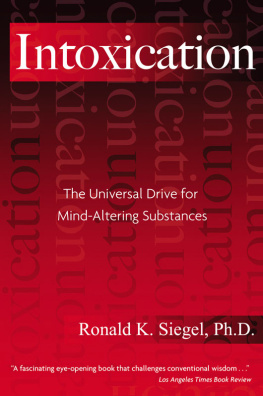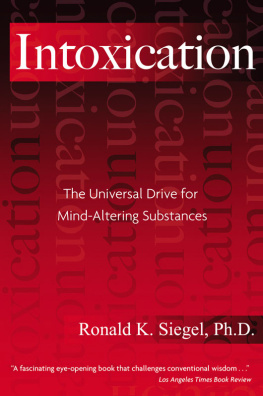Siegel - The Developing Mind, Third Edition
Here you can read online Siegel - The Developing Mind, Third Edition full text of the book (entire story) in english for free. Download pdf and epub, get meaning, cover and reviews about this ebook. publisher: Guilford Publications, genre: Religion. Description of the work, (preface) as well as reviews are available. Best literature library LitArk.com created for fans of good reading and offers a wide selection of genres:
Romance novel
Science fiction
Adventure
Detective
Science
History
Home and family
Prose
Art
Politics
Computer
Non-fiction
Religion
Business
Children
Humor
Choose a favorite category and find really read worthwhile books. Enjoy immersion in the world of imagination, feel the emotions of the characters or learn something new for yourself, make an fascinating discovery.
The Developing Mind, Third Edition: summary, description and annotation
We offer to read an annotation, description, summary or preface (depends on what the author of the book "The Developing Mind, Third Edition" wrote himself). If you haven't found the necessary information about the book — write in the comments, we will try to find it.
Siegel: author's other books
Who wrote The Developing Mind, Third Edition? Find out the surname, the name of the author of the book and a list of all author's works by series.
The Developing Mind, Third Edition — read online for free the complete book (whole text) full work
Below is the text of the book, divided by pages. System saving the place of the last page read, allows you to conveniently read the book "The Developing Mind, Third Edition" online for free, without having to search again every time where you left off. Put a bookmark, and you can go to the page where you finished reading at any time.
Font size:
Interval:
Bookmark:
Welcome to an intellectual feast that will also enrich your emotional life. Siegel is masterful at synthesizing multidisciplinary knowledge to give us an understanding of the mind that is both scientifically rigorous and richly imbued with experiential meaning. The third edition of this classic text incorporates new findings from thousands of recent studies, while retaining the fresh excitement of the field of interpersonal neurobiology that Siegel inaugurated 20 years ago. Indispensable reading for anyone interested in how the mind emerges from the interface between brain and interpersonal experience.
ALICIA F. LIEBERMAN, PhD, Irving B. Harris Endowed Chair in Infant Mental Health and Professor, Department of Psychiatry, University of California, San Francisco
I can only describe this as a unique and astounding book about child development that every therapist must have in his or her library. Siegel is thorough and incredibly informative as he explains the childs developing social mind and brain. The book is also very readable.
JOHN M. GOTTMAN, PhD, The Gottman Institute, Seattle, Washington
Siegel presents an up-to-the-minute third edition of a book that is already in wide use. He elucidates the neurological underpinnings and social processes that have made humanswith our peculiar questing for intersubjective engagementso different emotionally from other apes. No book I know of more clearly lays out, step by step, how people develop in response to those around them, and how variable those outcomes can be.
SARAH BLAFFER HRDY, PhD, Professor Emerita of Anthropology, University of California, Davis
This comprehensive book reviews three decades of neuroscience related to learning with others in the early months, and reveals new ideas about how the mind grows when a child is thriving. Siegel, a leader in child and family mental health, generously shares his expertise. He traces how the infant is committed from birth to play a part in the life of a community of personalities, and how our emotions, bodies, and brains move together in search of kindness and connection.
COLWYN TREVARTHEN, PhD, FRSE, Professor Emeritus of Child Psychology and Psychobiology, University of Edinburgh, United Kingdom
The importance of Siegels work has been reflected in the interest, enthusiasm, and joy that his interpersonal neurobiology has brought to people around the world for more than two decades. The third edition of The Developing Mind presents the ongoing neuroscientific research that supports the books initial hypotheses and expands their applications in psychotherapy, education, and mindfulness. It offers a window into Siegels evolving synthesis of his theories of mind into the core of interpersonal neurobiology. Readers will find themselves on a wonderful intellectual and personal journey.
LOUIS COZOLINO, PhD, Graduate School of Education and Psychology, Pepperdine University
An astonishing accomplishment. Somehow, Siegel explains the amazingly complex human mind to nonscientists and scientists alike. As a child psychologist, I find much of The Developing Mind of great interest and relevance to my practice, including excellent material on early attachment and trauma. The third edition has been completely updated with the most recent research and writings across multiple disciplines. Students and professionals in diverse fields will find interesting and useful material in this impressive work.
DEBORAH ROTH LEDLEY, PhD, private practice, Plymouth Meeting and Narberth, Pennsylvania
I used the second edition in our required social work practice course for graduate students. My students gained an understanding of the meaning of mind, how the mind emerges from the brain, and the way the mind is shaped by interpersonal relationships. I used the text to demonstrate how an interpersonal neurobiology framework can be utilized in assessment, diagnosis, and treatment of infants, children, and adolescents. Readings and discussions also helped students explore aspects of their own identity and subjective mental processes.
MARIAN S. HARRIS, PhD, School of Social Work and Criminal Justice, University of Washington Tacoma
Siegel skillfully navigates readers through the disquiet of fatalism and destiny toward hope and understanding of how our neurobiology is shaped by our society and how we in turn shape our society. Siegel provides a well-integrated thesis on the developing mind and leads the reader from an understanding of the neuron and neuronal networks to the development of social meaning and the social experience within the context of neurobiology. In-depth exploration is encouraged by the excellent citations. The Developing Mind is an outstanding addition to the library of those who are interested in how the mind develops, and it is likely to become a well-thumbed reference over the years.
PsycCRITIQUES
Fulfilled my wildest expectations. Instead of laboriously struggling to learn about neurobiology, I found myself fairly effortlessly assimilating information because 1) the author is able to present his material in the context of interpersonal relationships in general and the treatment dyad in particular, and 2) the author is a master of lucidity, avoids pedantry, and succeeds in making his data clinically useful.
American Journal of Psychiatry
Readable, thoughtful, and informative.
Educational Leadership
A remarkable book. The Developing Mind boldly transcends the reductionism that characterizes so much of contemporary psychiatry.
Psychiatric Times
Why cant we remember what we did at age three? Why are some children unusually shy? What is the biochemistry of humiliation, and how can it be toxic to the developing childs brain? New and plausible answers to these questions emerge from Siegels synthesis of neurobiology, research psychology and cognitive science. His subjecthow we become the people we aredeserves to hold many readers spellbound.
Publishers Weekly
The story Siegel tells is indeed fascinating, essentially describing the transactional processes that happen at the interface between developmental neurobiology and the environment of an individual. He links every level of the system from cell chemistry to brain architecture, to caregiverinfant attachments, to interpersonal relationships in adulthood. This is a book to stimulate, illuminate, and drive our understanding of human developmental processes forwards and I suspect that The Developing Mind will be seen as a milestone work in the future.
Journal of Child Psychology and Psychiatry
THIRD EDITION
Daniel J. Siegel

THE GUILFORD PRESS
Epub Edition ISBN: 9781462542833; Kindle Edition ISBN: 9781462542772
2020 Mind Your Brain, Inc.
Published by The Guilford Press
A Division of Guilford Publications, Inc.
370 Seventh Avenue, Suite 1200, New York, NY 10001
www.guilford.com
All rights reserved
No part of this book may be reproduced, translated, stored in a retrieval system, or transmitted, in any form or by any means, electronic, mechanical, photocopying, microfilming, recording, or otherwise, without written permission from the publisher.
Last digit is print number: 9 8 7 6 5 4 3 2 1
The author has checked with sources believed to be reliable in his efforts to provide information that is complete and generally in accord with the standards of practice that are accepted at the time of publication. However, in view of the possibility of human error or changes in behavioral, mental health, or medical sciences, neither the author, nor the editor and publisher, nor any other party who has been involved in the preparation or publication of this work warrants that the information contained herein is in every respect accurate or complete, and they are not responsible for any errors or omissions or the results obtained from the use of such information. Readers are encouraged to confirm the information contained in this book with other sources.
Next pageFont size:
Interval:
Bookmark:
Similar books «The Developing Mind, Third Edition»
Look at similar books to The Developing Mind, Third Edition. We have selected literature similar in name and meaning in the hope of providing readers with more options to find new, interesting, not yet read works.
Discussion, reviews of the book The Developing Mind, Third Edition and just readers' own opinions. Leave your comments, write what you think about the work, its meaning or the main characters. Specify what exactly you liked and what you didn't like, and why you think so.

